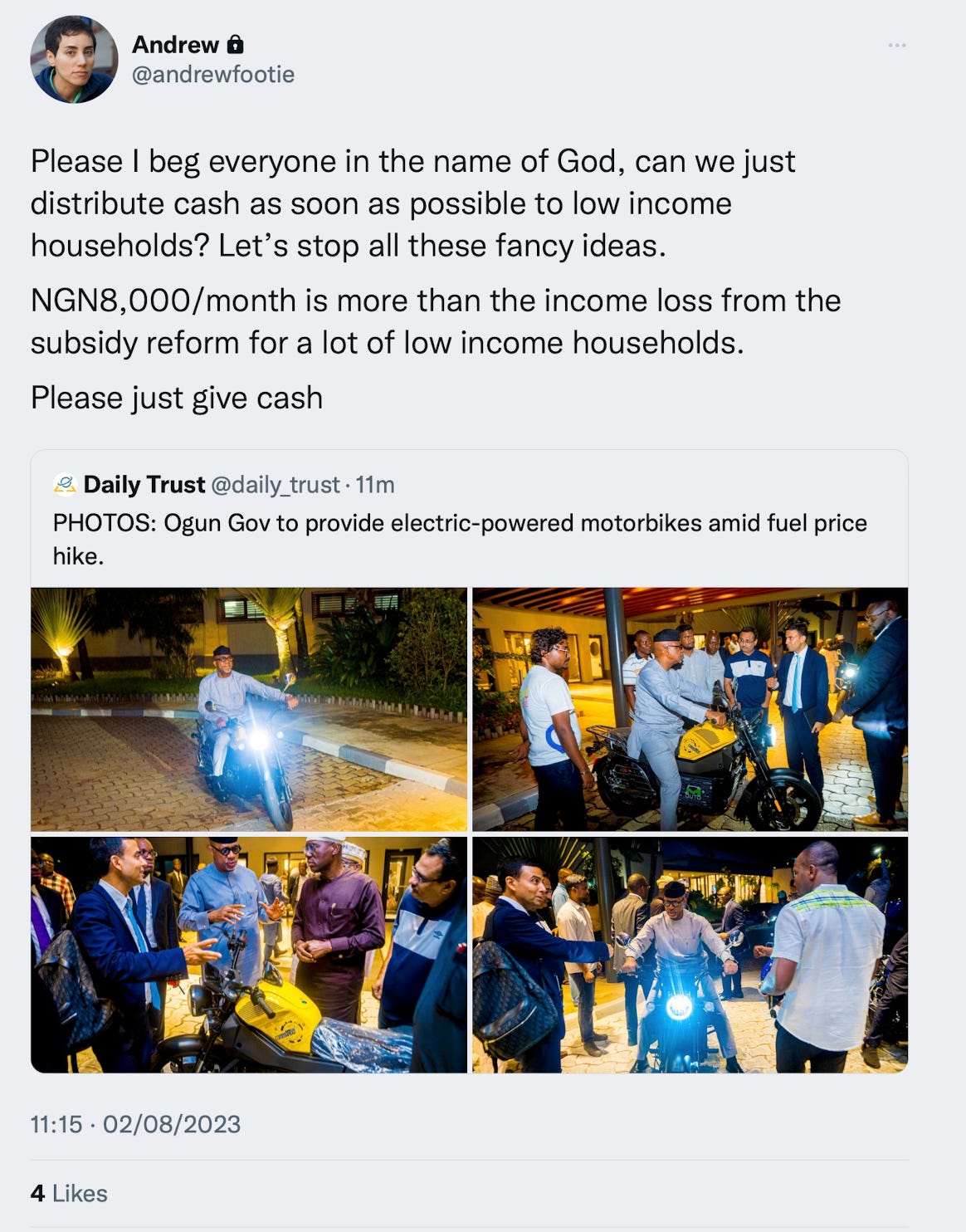Let the poor breathe by giving them N8k
My friend Andrew put out the tweet below:
This is something Andrew and I have been discussing privately. I don’t want to link to anyone in particular to avoid any kind of personal attacks but it will not be difficult to find members of the Nigerian elite being openly and loudly against the government’s proposed N8,000 (roughly $10) per month palliative to poor Nigerians reeling from the spike in petrol prices following the removal of fuel subsidies, in addition to the stubbornly high inflation they were already battling.
But right at the very moment when poor Nigerians need any help they can get, Nigerian politicians decided to start a fight over the register to determine who gets this N8,000 per month palliative. Governor Soludo of Anambra went as far as calling it the ‘so called national register’.
Nigerian politicians behaving badly and insensitively to the plight of the poor is hardly anything new — Senator Akpabio did not see anything wrong making a joke out of the poor on video, for example:
But it will be a mistake to think it’s just politicians who have something against giving the poor a small amount of cash as a palliative. The Nigerian elite hate it, too.
The first reason is straightforward — the elite don’t have much time for something that will not benefit them in any way. Say the government were to announce subsidised airfares and dollars as a ‘palliative’, they would have been all over it. But the reaction you might expect in such a scenario would be indifference not active sabotage as is currently the case.
The second reason might be to do with something that is not unique to Nigeria. Nearly a decade ago, the Zambian government tried out a no-strings attached cash transfer programme that paid around $18 per month. But when the programme was to be rolled out nationwide after the successful pilot phase, the government restricted eligibility because it detected hostility from Zambians towards giving people cash.
NPR wrote a story about the programme a few years ago:
That option was considered too controversial, explains Esther Ngambi, the official in charge of the new cash program.
“Everybody would be saying that you’re trying to give money to lazy people — that you’re encouraging laziness,” Ngambi says.
For years, evidence has been mounting about the effectiveness of cash aid over traditional aid to the poor such as food or seeds or job training. But Zambia’s experience suggests that when it comes to persuading governments to adopt the approach, evidence might not be enough. Zambia’s study — which spanned five years, analyzed data from 5,500 households and cost about $5 million — is one of the most significant to date. And the country’s commitment to pouring its own resources into cash aid has established it as a leader of one of the most intriguing trends in the fight to conquer poverty. Yet this is also a tale of how gut feelings about which poor people deserve our help, and which do not, can be so entrenched they led a government to ignore the most powerful lesson of its own experiment.
The rest of the article goes on to discuss how effective the cash transfer was as a programme and the various ways people spent the cash they were given. But it went back to the point about people (non-recipients) just not liking it:
Ngambi, the social welfare official, says there had been gripes from the public. To a lot of people the program meant young women were collecting a government check just for having a kid. People in the community and even in the media were accusing the women of having babies just to stay on the program. They were calling the women by the English word “divas” — in Zambia it connotes a woman who spends her time buying fancy clothes and fixing her hair. “Yeah,” says Ngambi, “we are turning them into these divas.”
As for the dads, she adds, “People would complain. The husband or the man in the house has the capacity to work so why should he be on the program?”
And Zambian leaders, who commissioned the trial, did not like the results either.
This presents a serious challenge when we think about how to help people. Some levels of poverty in Nigeria are so deep they are hard to describe or understand. For such people — and they are in the millions — getting N8,000 per month will be a transformational event, even if it’s only the cost of an afternoon meal for the elite.
The politicians of course have other dubious reasons for rubbishing the social register — they’d like to recompose the register before disbursements start so they can stuff it with their allies and use it as a vote buying tool. But they are also attuned to the whims of the elite mainly because in Nigeria, the further out you’re from the centre of power, the less likely it is for anyone to hear your voice.
And so we come to what Andrew’s tweet is highlighting. It is now a game of doing anything except give cash to the poor because giving cash to the poor might be ‘bad’. The reality is that none of these things are going to work or make a difference — electric bikes are a solution looking for a problem.
Give cash to the poor now as a stop gap measure while you’re doing the hard work on things like actual mass transit that make it easier to absorb big spikes in the price of fuel (by distributing the increase across a greater surface area).
In the meantime, expect more gimmicks.


